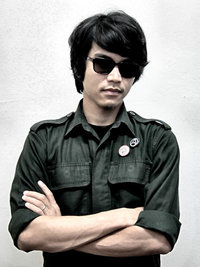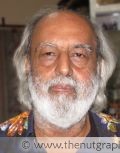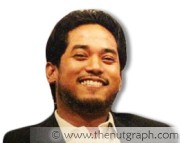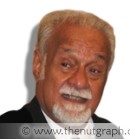
THIS month has been a particularly significant one for
The Nut Graph team. It is not only Ramadan and the month of Merdeka. It also marks our two-year anniversary and the month when we transform our operations into
Plan B.
While there’s constantly new beginnings to look forward to, these moments give us pause to look back on the highlights that make Malaysian political and cultural life memorable, poignant or significant.
And so, as we mark our 53
rd anniversary as an independent nation,
The Nut Graph celebrates, in no particular order, the following 10 individuals, groups and initiatives in the second annual Merdeka Awards. These are individuals and groups who boldly articulate their vision for Malaysia and put action to words, sometimes at personal risk and usually with personal sacrifice. They are awardees for having enriched the nation in some way.
We do not claim that this list is definitive or exhaustive in any way. Indeed, these are
our picks. We welcome readers to include theirs in the comments section to make the picture complete.

(Pic courtesy of Fahmi Reza)
 Fahmi Reza
Fahmi Reza
He was the 2007
Freedom Film Festival winner for
10 Tahun Sebelum Merdeka, a revelatory documentary about the nation’s untold history of the years leading up to our independence.
His current project researching the golden age of Malaysia’s student movement during the 1960s is no less significant. Fahmi’s
Student Power! is a riveting multimedia lecture. It narrates how autonomous and vibrant the Malaysian student movement was in holding the state accountable until the government suppressed it with the
Universities and University Colleges Act.
As if to prove the point that student activism will not be tolerated, Fahmi has been repeatedly barred from presenting his lecture to students at
Universiti Malaya, the place where the student movement was born. However, he remains
undeterred.
As a people’s historian who is connected to today’s youths, Fahmi is not only showing us which parts of our history have been suppressed, he is also making our history come alive by connecting the past to the present.


McKay (Pic courtesy of Pang Khee Teik)
and
Amir Muhammad
Benjamin McKay was a beloved writer, lecturer and academic with a deep passion for Malaysian, particularly Malay, film. He died of a cardiac arrest in July.
McKay, an Australian who made a home in Kuala Lumpur, wasn’t just a respected Malaysia film critic. He was also loved for encouraging his readers and students to critically engage with their culture, politics and society. And for a foreigner, his love for Malaysia was clearly demonstrated in his intellectual and social engagement of the country’s culture and politics.

(Pic courtesy of Amir Muhammad)
is an independent filmmaker, writer and publisher who addresses social political issues in his films and books. Already, two of his films,
Apa Khabar Orang Kampung and
The Last Communist, have been banned in Malaysia. (The Home Ministry has also confiscated copies of the queer anthology he published,
Body 2 Body.)
As the author of
Yasmin Ahmad’s Films and
120 Malay Movies, he continues the public discourse on Malaysian movies and film-making in this country.
With their shared love and passion for films made during the Golden Age of Malaysian cinema, both McKay and Amir held numerous
conversations about the topic and eventually became friends. Both deserve
The Nut Graph‘s Merdeka Award for their work and dedication to keeping the subject of Malaysian films intelligent and vibrant.

 Sisters in Islam
Sisters in Islam
They have been called un-Islamic and branded “dangerous”. They have even been
sued over the use of “Islam” in their organisation’s name. Critics have also lodged
multiple reports against the women’s rights group as if they were somehow a threat to security.
But
Sisters in Islam, informally formed in 1988 and officially registered in 1993, remains undeterred in their efforts to address the injustices and discrimination faced by Muslim women in the name of syariah.
In 2008, with researchers from Malaysian universities, they embarked on a study of the effects of
polygamy. The
results of the study, a first of its kind, were released in 2010. The study casts doubt on whether husbands in polygamous marriages are able to treat their wives and children equally as intoned by the Quran.
With their unwavering advocacy work, the group continues to fight for women’s rights within the Islamic framework, and they remain committed to demonstrating that Islam is a religion that is just, fair, merciful and compassionate.


Penan mother and child (Pic courtesy of Sofiya Israa)
In 2009, a government task force report confirmed that
Penan women and children in Sarawak were raped and sexually abused by timber workers. The sexual violations were first revealed by the Bruno Manser Foundation in 2008.
It took the national task force a year to confirm the rapes and sexual abuse, including of children as young as 10, by truck drivers of timber companies. Despite the report and evidence,
Sarawak government leaders repeatedly refuse to acknowledge the issue. No one has been arrested or charged with the crimes thus far, either.
Several
non-governmental organisations (NGOs) have pooled their resources to form the Penan Support Group (PSG) to assist the Penan survivors and provide information to the police. The PSG, now comprising 36 NGOs, has been unwavering in its efforts to seek justice and support for the Penan. They kept the spotlight on the issue with their
fact-finding mission and follow-up report,
A Wider Context of Sexual Exploitation of Penan Women and Girls in Middle and Ulu Baram, Sarawak, where they detailed in Parliament that seven more Penan women had been sexually abused.
When their report was refuted by Women, Family and Community Development Deputy Minister
Heng Seai Kie, the PSG railed against these denials. Under an avalanche of denials and the attempts to sweep the
Penan rapes under the carpet, the PSG’s continued work is critical in protecting vulnerable and marginalised Malaysians.


Gurmit Singh
This environmental group celebrates its 25th anniversary this year. Under the leadership of veteran environmentalist
Gurmit Singh,
Cetdem has been committed to promoting sustainable development by developing and maintaining projects that deal with energy, climate change and organic farming.
Indeed, the organisation began its
Mobilising Malaysians on Climate Change project in 2002, long before climate change became a popular buzzword.
Cetdem continues to organise seminars, the popular Hari Organik, and exhibitions, as well as critically examine national policies on development.
What’s next? It aims to establish a think-tank which will look at environmental solutions that marry sustainable development with green technology. It also plans to deepen its work on transportation issues, a pet subject and concern of Gurmit’s, who famously still relies on his bicycle and public transportation. With its insistence on practical technological and scientific solutions, as well as its community approach, Cetdem continues to do important work on sustainability.
 The Green Surf Coalition
The Green Surf Coalition
It was a question on many people’s minds: “Why are we building a coal power plant when we are moving towards a national green agenda?” Once some feisty environmentalists and passionate Sabahans found out that there were plans to build a coal-fired power plant in
Lahad Datu, they sprung into action.
Galvanising green groups, NGOs and individuals, they formed the
Green Surf Coalition. Their protests have been vocal and have used postcards, petitions, Facebook, Twitter and blogs. This anti-coal power coalition has not only shown what social media and networking can do to help get their message across, they have made inroads into Parliament. They managed to persuade Speaker Tan Sri
Pandikar Amin Mulia to set aside time to debate the controversial plant in Sabah.
The 300MW plant was first proposed several years ago but cancelled twice due to protests. But now it’s been listed in the 10th Malaysia Plan as one of several high-impact projects to be completed by 2015. The plant is to be built near one of Sabah’s most pristine marine sites.
Green Surf’s protests appear to be making an impact. The
prime minister himself said public views on the project would be sought. At the same time, coalition members are considering
legal action over the plant. Whatever happens, we are guessing that Green Surf is not about to sit back quietly over the issue.

 Khairy Jamaluddin
Khairy Jamaluddin
Merely bringing up his name raises all manner of debate on the state of politics and politicians in the country. But whether one likes, loathes or is indifferent towards Umno Youth chief
Khairy Jamaluddin, it is hard to ignore him.
After
winning the coveted wing’s leadership, he went on to surprise and shock by doing the unthinkable within Umno: calling for his party to ditch “
ketuanan Melayu” in favour of “Malay leadership”. He also argued for meritocracy and competition in the face of fundamentalist forces within and outside the party that continue to demand for “Malay rights”.
In his maiden policy speech as Umno youth head, Khairy urged Malay Malaysians to defend the rights of all Malaysians, saying this would only encourage mutual respect.
As a savvy user of social media networking, the politician has also engaged youths, critics and his political rivals within and outside of cyberspace. Through these engagements, Khairy continues to show that he isn’t what Malaysians might expect of a traditional ultra-Malay Umno Youth chief. He has even been openly critical of the
cabinet, bluntly describing the cabinet’s decision to disallow local university students from joining political parties as “gutless” and “outdated”.
Whether it is a calculated crafting of a new image, or a genuine attempt to move beyond racial politics, Khairy is on our list for boldly going where no contemporary Umno politician has gone before.

 Karpal Singh
Karpal Singh
Post-2008 saw a flurry of politicking, rhetoric and jostling among political parties in the changed political landscape. But one Tiger of Jelutong remained steadfast in his beliefs, often at odds with his colleagues.
In 2009,
Karpal Singh said the
DAP should seriously consider getting out of the Pakatan Rakyat after Opposition Leader Datuk Seri Anwar Ibrahim openly encouraged crossovers. A lone voice in the DAP, he also said, “
Anwar Ibrahim must repent for his action, and Pakatan Rakyat should look for a new leader and not one that promotes party hopping.”
That is not all. Staying true to his principles, he has also taken PAS and Anwar to task on the idea of an
Islamic state, and called PAS president
Datuk Seri Abdul Hadi Awang an “embarassment” over proposed
unity talks with Umno. And on 28 Aug 2010, Karpal once again remained adamant in his opposition to PAS’s suggestion that
hudud could eventually be implemented in Malaysia.
A
motor vehicle accident in 2005 has since left Karpal using a wheelchair and with neuromotor problems in his right arm. But personal adversity has not dampened the politician’s fervour for public duty. Whatever the topic, the politician has been consistent and vocal about his principles as a politician, no matter the risk.

Wong
 Joshua Wong
Joshua Wong and
Chou Z Lam
Two Malaysian journalists working within the confines of the controlled traditional media stood up for journalistic ethics and integrity at personal cost in 2010.
Joshua Wong, who was an
ntv7 producer, quit the Umno-linked television network after network bosses opted to restrict his show from discussing several national issues because of political interference. He didn’t just quit, he also publicly spoke up against political controls within his newsroom.
Chou Z Lam, a TV2 producer, revealed that his nine-part documentary on the Bakun Dam’s social impact was taken off the air due to political interference. He was later
fired.
Both have also spoken up about the serious problems of
self-censorship in Malaysian
journalism. The two have pretty much disassembled Prime Minister
Datuk Seri Najib Razak‘s declaration that “the press is free to report on pretty much anything”.
 Epic – Voice Your Choice
Epic – Voice Your Choice
There are currently five million unregistered voters aged 30 and below. Instead of waiting for the Election Commission to make concrete efforts to encourage the young to vote, a group of youths known as Extraordinary People Impacting Community (
Epic) decided to launch
Voice Your Choice.
Originally a group predominantly focused on helping the Orang Asli, Epic is aiming to register two million voters by the next general election through
Voice Your Choice. The project is targeting the younger generation.
Within months of the initiative’s launch in April 2010, the group managed to get 22,000 new
Malaysian voters registered. Stressing that they are strictly nonpartisan, Epic has organised groups of volunteers to set up booths in high-traffic malls to register new voters. Will they be successful? Time will tell, but thanks to Epic, the ball has started rolling.
 KUALA LUMPUR, Aug 31 – Selangor executive councillor Teresa Kok asked Datuk Seri Hishammuddin Hussein today to retract his statement and apologise to Serdang MP Teo Nie Ching for calling her “dirty.”
KUALA LUMPUR, Aug 31 – Selangor executive councillor Teresa Kok asked Datuk Seri Hishammuddin Hussein today to retract his statement and apologise to Serdang MP Teo Nie Ching for calling her “dirty.”


 His flair for leadership unfolded in England. Realising the Malay students there were not represented by any organisation, he established the Kesatuan Melayu Great Britain (Malay Association of Great Britain) and became its first secretary.
His flair for leadership unfolded in England. Realising the Malay students there were not represented by any organisation, he established the Kesatuan Melayu Great Britain (Malay Association of Great Britain) and became its first secretary. His first mission was to travel throughout the nation to meet people from all walks of life and various races to promote unity. His efforts in overcoming the country's political problems by way of cooperation among the various ethnic groups saw the birth of the Alliance Party in 1955.
His first mission was to travel throughout the nation to meet people from all walks of life and various races to promote unity. His efforts in overcoming the country's political problems by way of cooperation among the various ethnic groups saw the birth of the Alliance Party in 1955. “At this solemn moment, I call upon you all to dedicate yourselves to the service of the new Malaya: to work and strive with hand and brain to create a new nation, inspired by the ideals of justice and liberty - a beacon of light in a disturbed and distracted world. High confidence has been reposed in us; let us be united and face the challenge of the years ahead.”
“At this solemn moment, I call upon you all to dedicate yourselves to the service of the new Malaya: to work and strive with hand and brain to create a new nation, inspired by the ideals of justice and liberty - a beacon of light in a disturbed and distracted world. High confidence has been reposed in us; let us be united and face the challenge of the years ahead.”



 THIS month has been a particularly significant one for The Nut Graph team. It is not only Ramadan and the month of Merdeka. It also marks our two-year anniversary and the month when we transform our operations into
THIS month has been a particularly significant one for The Nut Graph team. It is not only Ramadan and the month of Merdeka. It also marks our two-year anniversary and the month when we transform our operations into 
 Fahmi Reza
Fahmi Reza 

 Sisters in Islam
Sisters in Islam

 Khairy Jamaluddin
Khairy Jamaluddin Karpal Singh
Karpal Singh
 (Asia Sentinel) Tibet's young lama seeks a role for Buddhism in environmentalism
(Asia Sentinel) Tibet's young lama seeks a role for Buddhism in environmentalism

